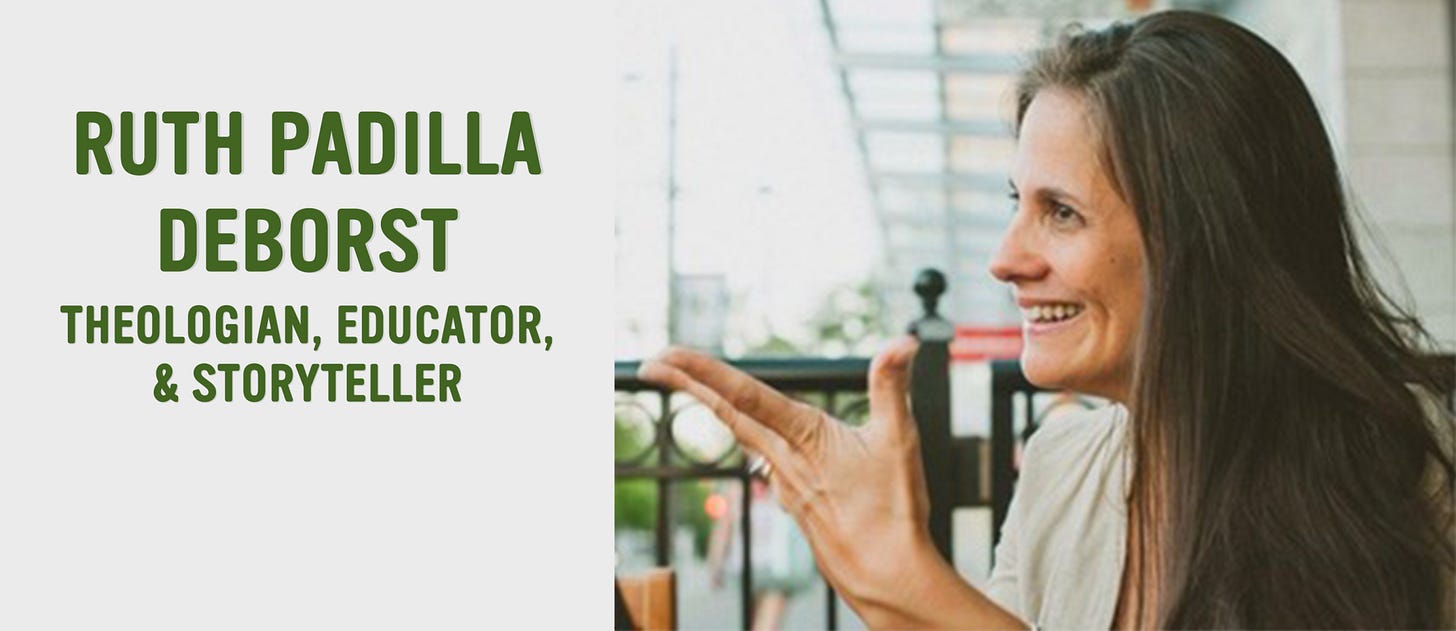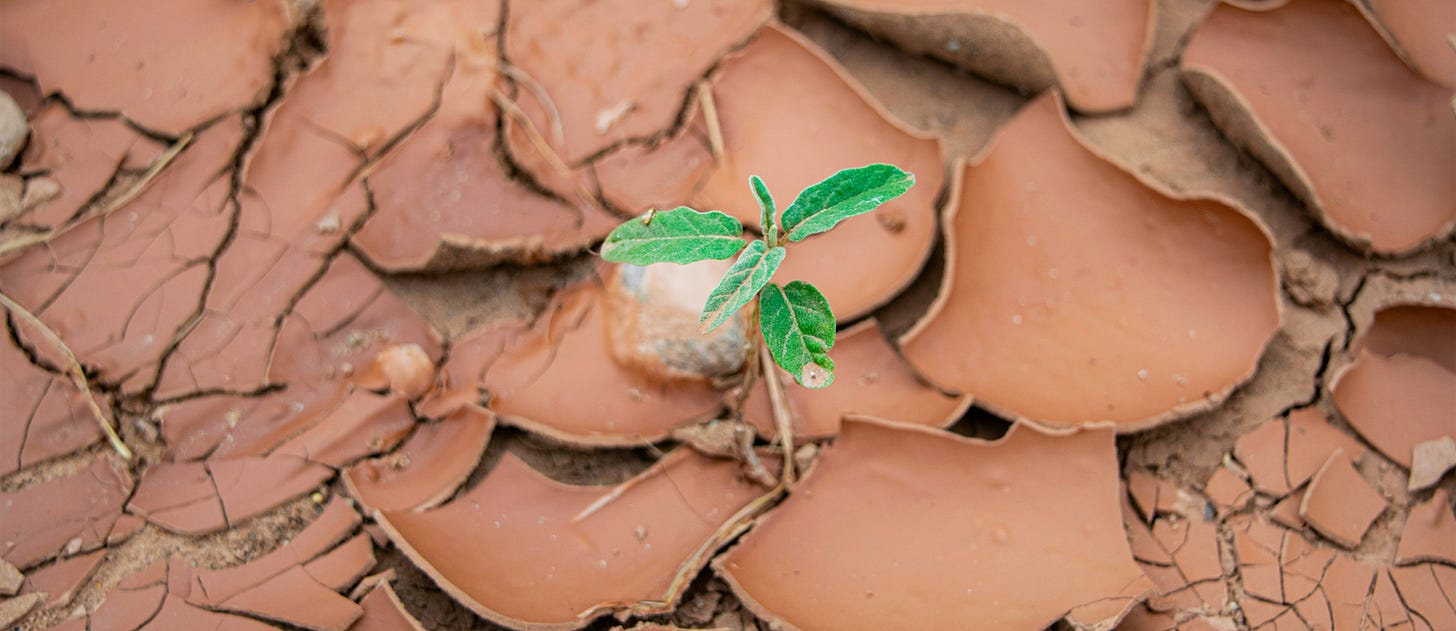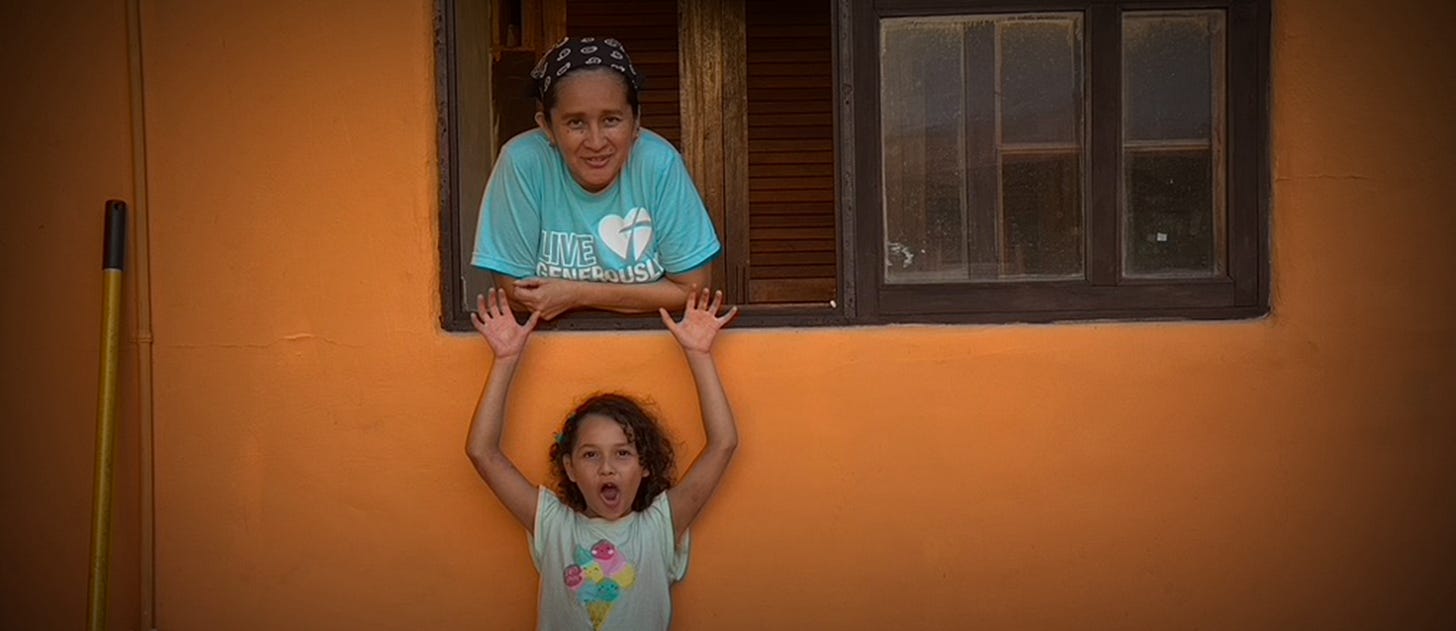Millions are already climate refugees
Land wins, climate migration, and sustainable community living with Ruth Padilla DeBorst
This week, guest editor Ruth Padilla DeBorst ushers us into the Christmas season. Ruth is a theologian, educator, and storyteller who has dedicated her life to fostering peace and justice in this beautiful yet broken world we call home. For decades, she’s been deeply involved in leadership development and theological education across her native Latin America and, more recently, in sustainable development and caring for many of the migrants who pour through her home country of Costa Rica.
Ruth teaches at Western Theological Seminary and serves with the Comunidad de Estudios Teológicos Interdisciplinarios, a learning community with students across Latin America. I’ve had the privilege of visiting Ruth and her husband, James, at Casa Adobe, the intentional Christian community where they live in Costa Rica, rooted in a shared commitment to justice and right living with creation. Most recently, we shared the stage at the Lausanne Congress, where her plenary talk on justice left a lasting impression.
Take it away, Ruth!
A school assignment when I was 9 years old back in 1970 had me digging into the Britannica Encyclopedia to find out about the condition of our planet. I read scientists’ dire analysis about pollution, biodiversity loss and climate change. In shock, I asked my mom, “If they know all this, what are people doing about it?”
Many decades have passed since that rude awakening, and my understanding of the complexities of these global challenges has grown, along with my frustration regarding the same question and my commitment to address it by all means available to me. Though I am not a scientist, I have been educating myself and the faith communities with which I am involved on these issues.
With deep concern about the interrelationship between people and planet, I pursue ecological justice through writing, speaking, teaching, advocacy, community life, and by accompanying climate migrants and refugees on their journey through Costa Rica with our small, local non-profit.
GOOD NEWS
The 16th UN Convention to Combat Desertification (UNCCD) was held earlier this month in Riyadh, Saudi Arabia. Desertification and land degradation affect nearly 40% of the world’s land area and over 1.5 billion people, driving poverty, hunger, and forced migration. So, the UNCCD isn’t only about deserts—it’s about the health of all land and its capacity to support life.
The drivers and impacts of land degradation are deeply connected to climate and biodiversity as well. For example, land degradation destroys ecosystems and reduces biodiversity. It also exacerbates climate change by releasing the carbon stored in ecosystems and diminishing the land’s ability to act as a carbon sink as well as to provide food in a warmer world.
Addressing the root causes of land degradation is essential for ensuring a sustainable future. That’s why I was so encouraged to hear that more business leaders than ever attended the UNCCD conference this year. The Business for Land Forum brought together global business leaders, policymakers, and experts to highlight best practices, mobilize finance, and foster collaboration for sustainable land and water management.
Additionally, the conference got off to a very good start. “With over $12 billion pledged for major land restoration and drought resilience initiatives in just the first two days, this is already proving a landmark moment in the fight against drought,” Dr. Osama Faqeeha, Deputy Minister for Environment and Advisor to the UNCCD 16 Presidency, announced.
And each year, the UNCCD highlights ten young “land heroes” from around the world who are using developing innovative ways to transform agriculture, enhance drought resilience and restore land. This year, the land heroes include Grace Magny-Fokam from Cameroon, whose youth-led non-profit research institute developed FoliaNet, an AI-powered device that detects diseases in crop plants, and Astrid Peraza Juárez, a materials science engineer from Costa Rica who’s working to ensure girls have access to climate education. These are all very valuable steps in the urgent and right direction!
NOT-SO-GOOD NEWS
Millions of people across Latin America and the Caribbean are now being forced to migrate, both internally and across borders. Over a quarter of global migrants are on the move in this corner of the world where I live.
Migration is often provoked by a combination of unsustainable factors such as poverty and violence. But increasingly, the region is suffering the impact of a warming planet that is driving more frequent and prolonged droughts, extreme heat waves, increased precipitation, devastating floods, severe storms, wildfires, and landslides. Last year, it’s estimated that nearly 7 million people were displaced within their own countries due to weather and climate-related disasters leading to loss of housing, crops, livestock and livelihoods.
More specifically, four of the seven Central American countries are ranked among the 20 most severely affected by extreme weather events. A desertifying area known as the Dry Corridor covers 40 percent of the land area of Guatemala, Honduras, El Salvador and Nicaragua. Too little water forces people to move, so that they are able to eat.
Meanwhile, in the Caribbean, rapid sea level rise brings too much water to low-lying coastal areas, which also forces people to migrate as they lose their homes and livelihoods. In South America, hundreds of thousands of Venezuelans making the journey north through the Darien Gap are threatened by increasingly strong river currents and landslides in what is already a mostly impassable jungle.
In this season of Advent, many people around the world prepare to celebrate the birth of a child whose parents fled their homeland to escape violence. Today, caring for migrants displaced by “global weirding” demands urgent, collaborative efforts to address the complex challenges driving their vulnerability—especially climate change.
GET INSPIRED
Our community in Costa Rica, Casa Adobe, is an experiment in sustainable living. By sharing life, we are able to reduce our ecological footprint.
For example, in Costa Rica as in many other countries around the world, you can drink most water out of the tap, and that same good drinking water is being used to flush toilets! So we recycle our “grey water” from our showers. We have installed plumbing and a pump to take the used water from showers to feed into toilets and to water the vegetable garden. We also heat our water with simple solar heating. We reduce our use of single-use plastic and make eco-blocks with the plastic we do end up with. We compost, garden, and raise our own animals for meat.
Beyond those in-house actions, the small non-profit we founded over a decade ago, Asociación Casa Adobe, runs a tree green-house, urban arborization and reforesting in an under-served neighborhood. Neighbors young and old engage in river clean-up and advocacy for the recovery of the river. A few kilometers away, in the cloud forest, our Casa Nube serves as a base for conservation, scientific research, bird-watching, and environmental education for local and foreign scientists and other guests.
Further afield, in response to the plight of the thousands of migrants making their way through Costa Rica, Casa Esperanza offers friendly accompaniment, food and shelter to vulnerable families who have been displaced by violence and climate change.
The work we do at our three Casas reminds me every day that sustainable living is about more than infrastructure or individual choices. For us, it’s about cultivating hope through practical actions taken in community. Whether recycling water, planting trees, or offering refuge to migrants, I believe it’s a way to live out our calling to love one another and to care for this home we all share.
Thank you, Ruth, for sharing your heart and your work in this week’s newsletter. I’m inspired by how your community lives out your faith with such integrity, incorporating care for both people and the planet into every aspect of your lives. Your work at Casa Adobe, Casa Nube, Casa Esperanza, and your role as a thought leader in Christian circles around the world, gives us all a powerful example of what it means to embody love and justice in action.
To learn more about Ruth’s work, you can follow Casa Adobe on Instagram and Facebook, or learn more about the organization here or by listening to this podcast with Forrest Inslee on Creation Care and Community.
Wed Jan 29 at 6:30pm ET - Envisioning a Livable Future with Nancy Tuchman, Benjamin Sovacool, and John Carroll University - in person at John Carroll University in University Heights, Ohio, and online; registration link above.








Katherine gets a mention in this guest column in the Daily Montanan https://dailymontanan.com/2024/12/24/what-would-the-magi-do/
"Cultivating hope through practical actions taken in community" - love it.